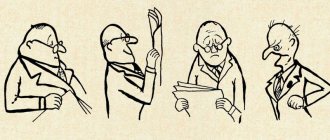Types of temperament have been studied by people since ancient times. The most ancient and most famous thinker of those times is Hippocrates; he proposed to introduce the concept of a typology of four temperaments and described 4 of their types. Hippocrates managed to identify general patterns among the many individual variations of the psyche. People with pronounced traits of a certain temperament are not so common; most often there is a mixed temperament in various combinations.
The concept of “temperament” still attracts the attention of scientists and practitioners, remaining largely an unresolved and controversial problem.
The basis of personality
Temperament is a certain biological basis on which personality is built. Temperament determines the mechanisms of psychological activity and the ability to socially adapt. On its basis, social properties of the psyche are formed. From a physiological point of view, temperament is a type of higher nervous activity.
Scientists consider Hippocrates to be the father of the theory of human temperament. Later, the philosopher and physician Claudius Galen developed this theory and became the author of the scientific treatise “Correct Measure.” This work describes four types of temperament according to basic biological substances. Blood plays a key role in the formation of the sanguine type. For a choleric person, the main substance is bile. The phlegmatic type develops under the strong influence of phlegm. And melancholic in a person is determined by the so-called “black bile”.
No type of temperament is found in its pure form. Every person has a basic temperament, developing or suppressing it depending on circumstances. In different situations, the same person is capable of exhibiting traits of all four types.
Phlegmatic - characteristics: pros and cons
A phlegmatic person is a balanced person who carefully thinks through his every step. Usually such people have an analytical mind and look at life around them soberly.
Phlegmatic people are quite lazy, often prefer not to be active and go with the flow. They are always calm and unperturbed. Even if they have experienced stress or an unpleasant life situation, they do not always show their temper.
It is difficult to anger a phlegmatic person; his nervous system is like a scale keeping balance. If it is difficult to bring him to simple emotions, then making him show activity or joy is even more difficult.
In other words, the phlegmatic type of human temperament is recognized as the most balanced and emotionally stable.
Phlegmatic people do not immediately make contact with people; they need time to assess the situation. A sudden change in the environment is like a tragedy for them and it is very difficult to bear. These people do not like active entertainment, they like a cozy home environment, and often prefer to spend time alone with themselves.
Phlegmatic people are painstaking and diligent in their work, they have a good memory and can remember large amounts of information.
Phlegmatic people are rather closed and hidden; they are reluctant to show sympathy for another person. But if a phlegmatic person likes a representative of the opposite sex, then he will do everything to achieve his favor.
It is quite difficult to find friends with a phlegmatic person; he does not make contact well. But if a person with this type of temperament finds a friend, then this friendship can last a lifetime. For phlegmatic people, family is a kind of fortress in which they feel comfortable. Such people get married late and may spend a long time searching for a partner.
Properties of temperament
Each type of temperament is determined by the presence of specific properties, namely:
Extraversion and introversion
These qualities are based on emotional reactions, on the speed of volitional actions.
Activity and passivity
These properties show a person’s reaction to negative events and difficulties, and also determine the degree of his endurance, perseverance and determination.
Sensitivity
It manifests itself in the strength of the influence of external stimuli that force the psyche to react in one way or another. Different people react to the same event in completely different ways.
Reactivity
This term refers to an involuntary reaction of the psyche to irritating factors (they can be both external and internal).
Plasticity and rigidity
These qualities show a person’s ability to adapt to the environment and adapt to new circumstances.
Reactive Activity Rate
This property determines how quickly the psyche reacts to external stimuli.
Emotional excitability
Using this property, you can determine how much a person is able to control his emotions, speech and mental reactions.
Psychological feature of a sanguine person
If we talk about the psychological component of sanguine people, then in these people the degree of excitement in the central nervous system is quite high. On the contrary, the inhibition threshold is low, and therefore sanguine people perceive the world in a somewhat illusory way. But at the same time, thinking and memory functions are remarkably developed. Often sanguine people focus their memory only on what arouses their interest. They can remember funny incidents, but at the same time forget the birthdays of their friends. Sanguine people pay attention to noticeable details, such as bright clothes or the unusual hairstyle of their interlocutor.
The emotional background of sanguine people is quite diverse. These people are emotional and are not afraid to show their experiences to others. They often gesture when talking, and may hug or kiss when meeting. These emotions are completely sincere; a sanguine person wants to please people and receive the same reaction from them in return. Sanguine people are distinguished by unconventional thinking; they are constantly trying to learn something new, change their image or type of activity. Monotonous work and loneliness lead them to severe depression.
People with this type of temperament have a lot of friends. A sanguine person knows how to make friends, and always comes to a person’s aid in a difficult situation. In personal relationships, sanguine people are sometimes flighty. An excessive thirst for communication prevents them from building a strong family.
How is temperament different from character?
A person's temperament should not be identified with his character. The first term includes a set of genetic characteristics of the psyche. Temperament is formed in utero, it cannot be changed, but can only be superficially corrected by working on oneself and correctly setting life priorities.
Character is formed throughout life, changing in one direction or another. Interacting in the social sphere, individuals exchange behavioral and mental experiences, influence others and are subconsciously influenced by others.
Read also: Human character
The following factors can influence a person's character:
Upbringing, childhood experience, trauma
Parents and teachers play a key role in shaping a child’s character.
Level of education
Equally important is the desire to learn and explore the world, the desire to develop one’s personality, as well as perseverance, hard work and a focus on success.
Social environment
The environment can have a strong influence on character traits. “Whoever you mess with, that’s how you’ll gain!” - says popular wisdom.
Financial position
People usually become discouraged when they fail to escape poverty, and turn up their noses when things improve.
Temperament and character are not always closely interrelated. The same character traits can be assessed differently by other people. It depends on what temperament they have
* * *
Temperament depends on many factors. This includes climate, genes, and even age. The older a person gets, the more his mental reactions slow down. In youth, people tend to express feelings and emotions more violently.
In any case, there is no point in generalizing. The temperament of each of us is a bright kaleidoscope of positive and negative qualities that shape our individuality.
How to build a relationship with a temperamental person
When building a relationship with a temperamental person, you should be guided not by gender, but by a distinctive character trait. You need to communicate with such people as leaders. If a temperamental partner feels his dominant position, he will treat his soulmate with tenderness, trepidation and care.
If both partners are characterized by temperament, their relationship will be bright, emotional, and passionate. However, such an alliance cannot avoid a struggle for leadership. Relationships will be strong provided the partners are willing to compromise.
So, a temperamental personality is a psychological type with a special manner of behavior. In modern society, gender stratification is being erased - bright behavior is welcomed by both women and men.
Ideal relationship
General information
The concept of “temperament” was first introduced by the ancient Greek doctor Hippocrates. His theory of 4 types of personality is based on the predominance of one or another liquid in the body or, as the scientist called it, “vital juice.”
Accordingly, based on this hypothesis, 4 main personality types were identified:
- choleric - predominance of bile (from other Greek chole - bile);
- sanguine - predominance of blood (from Latin sanguis - blood);
- phlegmatic - predominance of phlegm (from other Greek phlegma - phlegm, “phlegm”);
- melancholic - predominance of black bile (from other Greek melas chole - black bile).
Later, Russian physiologist Ivan Pavlov emphasized not only the physiological characteristics of individuals, but also their similar mental characteristics. He noticed that each personality type is characterized by a certain set of basic innate properties of the nervous system.
In addition, each personality type is characterized by certain pronounced character traits and possible mental pathologies:
- choleric - impulsiveness and aggression, diseases - impulsive personality disorder;
- sanguine - mobility, sociality, self-confidence, illness - hypomania;
- phlegmatic - social withdrawal, self-absorption, diseases - schizoid personality disorders;
- melancholic - sadness, cowardice, depression, weakness, illness - anxious personality disorder.
As a rule, it is customary to distinguish 3 areas of manifestation of temperament:
- general activity level;
- level of emotionality;
- features of the motor sphere.
General activity is expressed in the degree of human interaction with the surrounding world - both natural (nature) and social.
The motor or motor sphere determines the speed of reactions, rate of speech, speed and clarity of movements.
Emotionality is characterized by receptivity, sensuality and the speed of changes in emotional state and mood.
Leaders are loved or hated
A temperamental person is usually a very bright, extraordinary personality. He literally radiates energy. Some people get tired of such people, others feed off them. Temperamental people are leaders, they can be entrusted with leading a team, but they are not always punctual, so it is better to entrust phlegmatic people to delve into the little things. Those are more scrupulous, they are not annoyed that everything needs to be double-checked.
Since a temperamental person is interested in everything, most often he directs his activities in one direction and achieves excellent results. Or he scatters himself, looking for himself.
The first option can easily become a politician, public figure, or leader; the second option can simply become a drunkard, since he does not know how to set goals.
Of course, this does not always happen, but temperamental people are usually very “hot” in everything, including relationships. They can love very much and also hate very much. You should not quarrel with a temperamental person, especially if it gets personal, as you can hear a lot of unpleasant things about yourself.
Description of types
Each personality type is special and individual. Next, we will consider a brief description, advantages and disadvantages of each type of temperament.
Sanguine
A personality type that is characterized by flexibility of thinking and pliability.
Anticipation of something new or unreasonable fear of the future can indicate a good sixth sense. But it doesn’t always “work like a clock” - in the article “How to develop intuition?” You can find several clever tricks for opening the “third eye”.
A cheerful and active sanguine person quickly gets along with people and knows exactly what he wants from life. Such a person cannot sit still and is extremely skeptical about monotonous work. A sanguine person switches quite easily from one type of activity to another, and almost always succeeds in any endeavor.
Such a person is easily given control over emotions, he easily meets new people and is always open to communication. Facial expressions and speech are very expressive; a sanguine person loves and knows how to speak in public.
Advantages:
- The sanguine type of temperament is characterized by cheerfulness, energy, cheerfulness, and responsiveness.
- The mood tends to change frequently, but generally a good mood prevails.
- Feelings of affection, hostility, joy and grief arise quickly in sanguine people, but they are shallow.
- Quickly grasps everything new and interesting.
- Quickly switches from one type of activity to another.
- He easily experiences his failures and troubles.
- Easily adapts to various life circumstances.
- Has good performance and endurance.
- He takes on any new business with enthusiasm.
- Characterized by loud, hasty, but at the same time clear speech, accompanied by active gestures and expressive facial expressions.
- When communicating with new people, he does not feel fear or constraint.
- Maintains self-control in stressful, critical situations.
- He is able to defend himself with arguments and at the same time tries to normalize the situation.
- Quickly wakes up and falls asleep.
- Shows persistence in achieving the assigned task and goal.
- Good organizer.
Flaws:
- If a sanguine person loses interest in the work he has started, then he abandons it without completing it.
- They don't like monotonous work.
- They tend to overestimate both themselves and their capabilities.
- The sanguine type is characterized by instability in interests and inclinations.
- A person with a sanguine type of temperament finds monotonous, everyday painstaking work a burden.
- Hasty in decisions, rash decisions, not collected.
- Unstable mood.
- It is difficult to develop strong-willed qualities.
To achieve success in their activities, sanguine people should not waste time on trifles; they need to be purposeful, careful, and diligent.
Phlegmatic person
Calm and measured, slow and absolutely balanced phlegmatic people are distinguished by their slowness and perseverance. They always clearly think through their every action, bringing everything they start to its logical conclusion. They are not used to giving in to difficulties and often become successful businessmen.
They are not used to showing off their feelings, for which they often receive the status of “cold” and “heartless.” Phlegmatic people are always in a stable mood and rarely succumb to external provocations.
Advantages:
- The phlegmatic type of temperament is characterized by calmness, composure, prudence, caution, patience, perseverance, balance and endurance, both in ordinary life and in a stressful situation.
- Shows consistency and thoroughness in his work, as a result of which he brings the work he begins to completion.
- Persistent and tenacious in achieving their goals.
- Phlegmatic people do not have a tendency to affect.
- Speech is calm, measured with pauses, without clearly expressed emotions, without gestures or facial expressions.
- Phlegmatic people are not talkative.
- Able to perform monotonous, long-term intense work.
- He calculates everything and does not waste his energy in vain.
- She adheres to a systematic approach to her work.
- They tend to adhere to the established, familiar routine of life.
- Follows the routine with ease.
- He has good endurance, which easily allows him to restrain his impulses.
- Not vindictive.
- Treats barbs directed at him condescendingly.
- Characterized by constancy in relationships and interests, they are often monogamous.
- They love order and neatness in everything.
- In phlegmatic people, reason prevails over feeling.
- They communicate well with people of other temperaments.
- Has a good memory.
- Phlegmatic people are reliable people who are difficult to anger.
- The feelings of phlegmatic people are deep, but carefully hidden from prying eyes.
Flaws:
- Phlegmatic people are practically not susceptible to approval and censure addressed to them.
- They react poorly to external stimuli, so they cannot quickly react to new situations.
- Stingy with emotions.
- The facial expressions and movements of a phlegmatic person are inexpressive and slow.
- Thorough to the point of being boring.
- He starts work slowly and just as slowly switches from one task to another.
- Has difficulty adapting to a new environment and is slow to get along with new people.
- There are many stereotypes and patterns in life.
- Unresourceful.
Phlegmatic people should develop the qualities they lack, such as mobility and activity. Avoid the manifestation of such qualities as: inertia and lethargy.
Choleric
The choleric type of temperament is characterized by decisiveness, initiative, and straightforwardness. Mental processes proceed too quickly, which makes people with this temperament somewhat unbalanced and abrupt. They are often unrestrained and hot-tempered, easily losing their temper even over trifles.
When communicating with a choleric person, you should be prepared for his irritability and impetuosity - people of this type can, in an emotional outburst, say nasty things that they will regret in a couple of seconds.
Advantages:
- Agile and fast.
- He gets down to business with passion, works on the rise, overcoming difficulties.
- Almost always resourceful in an argument.
- Forgiving and non-offensive.
- Has expressive facial expressions.
- The speech is lively and emotional.
- Able to quickly make decisions and act.
- Tirelessly strives for something new.
- He quickly falls asleep and wakes up, sleeps soundly.
- In a critical situation, he shows determination and drive.
- Feelings quickly arise and manifest themselves clearly.
Flaws:
- The choleric person is too hasty.
- The choleric type of temperament is characterized by sharp, impetuous movements, restlessness, imbalance, and a tendency to get hot.
- Not very patient.
- In relationships and in communicating with people, he can be harsh and straightforward.
- May provoke conflict situations.
- Stubborn, often capricious.
- Characterized by a sharp rise and rapid decline in activity, i.e. The choleric person works in fits and starts.
- Sometimes he does not delve into the essence of the problem, skims the surface, and gets distracted.
- Prone to risky behavior.
- Choleric people's speech is fast, sometimes confused, and passionate.
- Aggressive, very hot-tempered and uncontrollable.
- Prone to sudden mood swings and nervous breakdowns.
- When his energy supply is depleted, his mood plummets.
- Intolerant of the mistakes and shortcomings of others.
- Touchy.
Cholerics need to learn to restrain themselves and not be arrogant. They may be advised to count to ten before reacting to a situation.
Melancholic
People with a weak nervous system are very vulnerable and vulnerable. They are often offended and take any criticism personally. They take failures very hard and reproach themselves for mistakes in life for a long time. They love to be pitied and look for protectors among stronger individuals.
In the life of a melancholic person, everything is always bad - even if there are a lot of good people nearby, there is a good job and the house is full of prosperity, the melancholic person will find a reason to be sad.
Everything new puts people of this type into a stupor - spontaneous solutions to problems are alien to them, and if something does not go according to plan, it immediately leads melancholic people astray.
Advantages:
- The melancholic type of temperament is characterized by increased sensitivity.
- Melancholic people are able to perceive approval and censure.
- Makes high demands both on himself and on the people around him.
- They feel good about other people.
- Under favorable conditions, they are restrained and tactful.
- The emotional states and feelings of people with a melancholic type of temperament are distinguished by their depth, duration and great strength.
- Melancholic people are characterized by constancy and depth, acute susceptibility to external influences.
- In a familiar and calm environment, people with a melancholic type of temperament feel calm and work very productively.
Flaws:
- Melancholic people are distinguished from other types by their high emotional sensitivity.
- They have a hard time withstanding grief and resentment, although this may not appear outwardly.
- They keep their thoughts and experiences to themselves.
- Even minor failures are greatly experienced.
- Very shy, shy, vulnerable, secretive, indecisive, unsure of himself and his abilities.
- Always pessimistic, rarely laughs.
- At the slightest failure he feels depressed and confused.
- In an unfamiliar environment, he gets lost.
- A melancholic person is embarrassed when contacting new people.
- It takes a long time to adapt to a new team.
- Has a small circle of close people.
- Melancholic people have a tendency to loneliness, depression, suspicion, they become isolated and withdraw into themselves.
- They get tired quickly and need to take breaks while working.
- The melancholic type of temperament is characterized by weak, quiet speech up to a whisper, impressionability to the point of tearfulness, excessive touchiness and tearfulness.
- The slightest trouble or nervous environment at work can throw a melancholic person out of balance.
- Under unfavorable conditions, melancholic people are withdrawn, fearful, and anxious.
- Melancholic is the only type of temperament characterized by slight vulnerability and touchiness.
- Prefers to obey rules and authorities.
- On the eve of important events, he is always overly worried and worried.
- What a choleric person sweeps away on his way, a phlegmatic person does not notice, and a sanguine person bypasses, becomes an obstacle for a melancholic person. He gets lost, gives up, and it is at such moments that he needs sympathy and support from family and friends.
In terms of self-improvement and self-realization, melancholic people need to be more active, engage in organizational activities in order to feel their importance, confidence and increase self-esteem. This is also facilitated by physical education and sports, gymnastics.











